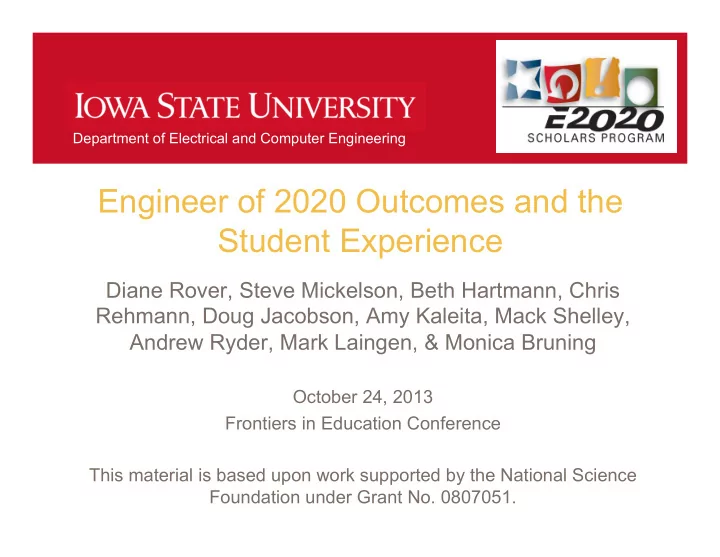

Department of Electrical and Computer Engineering Engineer of 2020 Outcomes and the Student Experience Diane Rover, Steve Mickelson, Beth Hartmann, Chris Rehmann, Doug Jacobson, Amy Kaleita, Mack Shelley, Andrew Ryder, Mark Laingen, & Monica Bruning October 24, 2013 Frontiers in Education Conference This material is based upon work supported by the National Science Foundation under Grant No. 0807051.
1 1 Outline • Background • E2020 Student Experience • E2020 Pillars and Modules • Curriculum Integration • Related Work • Future Work
2 2 Background • National Academy of Engineering’s “Engineer of 2020” report, 2004 • National Science Foundation Scholarships in STEM (S-STEM) Program • Iowa State’s S-STEM grant • Cohorts starting fall 2009, 2010, 2011 • Direct-from-high-school and transfer undergraduate engineering students from diverse backgrounds • E2020-related student development/learning opportunities
3 3 Cohorts Non- Year Total DFHS CC Women URM In Engr Grad. STEM 2009 22 14 8 4 5 81% 12 2 2010 26 12 12 12 4 81% 11 2 2011 25 16 11 11 3 88% 1 1 12 90% Overall 73 42 31 27 (37%) 24 5 (16%) (STEM)
4 4 E2020 Student Experience
5 5 E2020 Pillars and Modules • Leadership • Systems thinking • Innovation and entrepreneurship • Global awareness
6 6 E2020 Leadership Pillar • The first-year seminar provided an opportunity for students to view themselves as leaders. • Keirsey Temperament Sorter-II • During the sophomore seminar, students were introduced to new topics and exercises to emphasize the importance of interpersonal relationships, communication skills, and teamwork.
7 7 E2020 Systems Thinking Pillar • The FY seminar focused on getting students to appreciate the complexity arising from the interaction of factors from inside and outside engineering, feedback and dynamic behavior. • By the end of the sophomore seminar, students were expected to: (1) identify connections between subsystems with rich pictures, (2) explain relationships with causal loop diagrams, and (3) sketch the behavior over time of key variables in the system.
8 8 E2020 Entrepreneurship Pillar • In the first-year seminar, students were introduced to elements of entrepreneurship and explored what it means to approach problems from an entrepreneurial viewpoint. • By the end of the sophomore seminar, students developed a business plan for a proposed company to solve some aspect of a grand challenge problem. • Given the same problem domain, the best plan was identified, adding an element of competition to the learning experience.
9 9 E2020 Global Awareness Pillar • Global awareness: • being aware of and respectful of cultural and international differences in needs and values, • understanding how regional and cultural differences affect the engineering design process and engineering business enterprise in general, • being able to work effectively with others from different cultures • Culminating module
10 10 E2020 Global Awareness Pillar • FY seminar: students will have a better understanding of the need for questioning and analyzing their own assumptions (about needs, values, constraints, criteria, resources, etc.) when working on engineering projects. • Sophomore seminar: emphasis on identifying cultural dimensions to an engineering project • Hofstede’s cultural dimensions: classification of major cultural norms by country
11 11 Upper-level Project-Based Individualized Learning • Brenda, current E2020 Scholar, 2009 cohort, senior in ME, former E2020 peer mentor: president of Iowa State University’s chapter of Engineers Without Borders.
12 12 Upper-level Project-Based Individualized Learning • Kurt, graduated E2020 Scholar, grad student in ME, 2010 cohort, E2020 peer mentor, CC transfer: member of Iowa State’s Team LunaCY that won awards in NASA’s annual Lunabotics Mining Competition.
13 13 Upper-level Project-Based Individualized Learning • Joe, current E2020 Scholar, 2011 cohort, senior in ME, CC transfer: participated in the ISU BioMaP (Biological Materials and Processes) ! REU.
14 14 Cohort Surveys • Students liked meeting other engineering students, enjoyed the discussion of the four pillars, learned a lot about being an engineer, and think of the role of an engineer differently after ENGR 110. • Content covered in the E2020 seminars helped students to understand what the pillar concepts were all about. • Given the longer time spent with each of the pillars in ENGR 210, those students were more likely (than the ENGR 110 students) to agree they had increased their knowledge, skills, and abilities in the pillar areas. • Students commented that networking opportunities were the best aspect of the E2020 Scholars Program.
15 15 Curriculum Integration • Goal: identify ways to introduce the pillar topics to all engineering students, not only to E2020 scholars. • Faculty/staff development workshops at ISU • Engineering Learning Communities • ISU Learning Communities Mid-Year Institute • McHale et al. study (FIE 2010): Professional topics are typically emphasized in first-year design and capstone courses rather than integrated throughout the curriculum.
16 16 Related Work • Various initiatives across the U.S. motivated by the NAE Engineer of 2020 report • University of Wisconsin’s introductory course on the engineering grand challenges (FIE 2008) • Studies on universities preparing the engineers of 2020 (FIE 2008 panel, FIE 2009, FIE 2010) • Purdue University engineer of 2020 program • Grand Challenge Scholars Program (GCSP), led by Duke University, Olin College of Engineering, and the University of Southern California
17 17 Future Work • Formalized assessment of the pillars through well- defined student learning outcomes and instruments • ISU COE framework: Student outcomes as workplace competencies necessary for the practice of engineering at the professional level • Set of competencies and key actions for each pillar • Identification of competencies appropriate for each pillar should draw from emerging engineering education research on assessment of leadership, critical thinking, entrepreneurship, and cross-cultural skills.
Recommend
More recommend